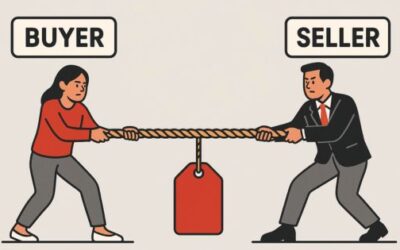There is no debate that questions are at the core of selling. There isn’t a sales guru, training, blog or sales video channel that doesn’t espouse the importance of questions in managing a sale. That debate has been settled, so this lesson isn’t about asking questions, it’s about getting better at asking good sales questions.
If there is one thing I notice with salespeople when it comes to asking questions is this, THEY SUCK AT IT. Sorry, but you do. Yes, I said YOU!
So many salespeople suck at asking buyers questions that I feel perfectly OK, telling you, you suck at it because the 1% of you who don’t, won’t be offended by the comment. The rest of you need a wake-up call.
Learning to ask questions is an art. It takes time and a commitment to perfecting the craft. I wrote the blog post The Question Test a few years ago, and it’s one of my favorites. I purposely wrote it to prove to myself that I could pass the questions test myself and to show readers the power of asking questions without making the other person feel like they are being interrogated. The post was written entirely with questions. It’s 414 words long, and I don’t make a single statement, it’s all questions. The post is fluid; it doesn’t make the reader uncomfortable. It doesn’t feel like an interrogation yet the entire post is nothing but questions.
LESSON 5 – LEARN TO ASK QUESTIONS BETTER
If you want to sell better, you have to get better at asking questions. There is no way around it. To be great at selling requires information and the best way to get information is from your buyers. Winning a sale rests in what customers know and don’t know about their organization and the possible solutions and then what you do with that information. Therefore, being a real badass in asking sales questions will elevate your sales game.
When it comes to questions, there are four factors to asking killer questions you must keep in mind
1) Tone
The right tone is critical when it comes to questions. It’s too easy to ask a great question, delivered with the wrong tone. Tone is fundamental when it comes to asking questions. You have to understand what tone is appropriate, how to use the tone accurately and when to shift from tone to tone.
Imagine you are about to ask a tough question regarding a process your buyer built themselves, in which they are very proud. You know the process is why they are having problems and know it’s shit, but you have to get him to see that, so you need to ask a number of very sensitive questions relating to the process. If your tone is accusatory, demeaning or even dismissive, you’re screwed. In a situation like this, I’d argue even a confident tone would fail. To win in this type of situation a tone of humility, openness, suggestion, and deference is required.
Tone is an art. When it comes to asking questions, it’s an art few sales people even consider, never mind understand. Salespeople often say they struggle with asking more than a few questions. They say they struggle with not feeling like they are interrogating their buyers. The reason they feel this way is because they are not in tune with the buyer and their tone is not aligned with their questions and the buyer’s emotions. Make sure your tone is right and aligned with the questions, the buyer’s emotions and the environment you’re inquiring about.
2) Timing
Timing matters, just because you can ask a question, doesn’t mean you should. The purpose of asking questions is to get information that isn’t readily available. It’s to get the information you can’t get on the web, or in a Google search. Because of this, you’re going to want to ask personal and sensitive questions that you just can’t blurt out in the very beginning.
Asking questions isn’t the objective, getting information is the aim. Therefore, if you ask a question and the buyer is unwilling to answer it or gives you a shallow, weak answer, you lose. You wasted a question. To sell better, you have to understand the timing of your sales questions. What questions should be asked now and what questions should be asked later? What questions should be asked first and what questions are follow up questions?
Understanding the order and flow of your sales questions allows great sales people to establish a flow that takes the buyer on a journey. It’s all dependent on the order and flow of your questions. Not understanding timing is awkward. When timing is off, like anything else, the experience is jolting, difficult to follow and eventually leaves participants feeling uncomfortable. Flow matters when it comes to asking sales questions, particularly when it comes to doing a kick-ass discovery call.
As you work on your question skills, pay attention to your timing. Learn to create a rhythm and flow in your questioning that takes your buyer on a journey. If you can get good at it, the destiny will be filled with informational gold.
3) Type
The type of question matters because you have to know what information you’re looking for. Different types of questions get various kinds of responses. A combination of tone and timing, type questions target a specific content or response. Think about the kind of questions you ask like different kinds of screw drivers. There’s flat head, a Phillips head, a Torx drive, a Robertson and an Allen wrench. All of these are screw drivers, yet are different types of screw drivers. The same concept applies to questions. There are personal questions, challenging questions, provoking questions and validating questions. What are the 4 types of sales questions?
Personal questions
Personal questions are designed to get personal information about the buyer, how they feel, what’s important to them, why they did something etc. Personal questions are just that personal.
Challenging questions
Challenging questions are designed to challenge the buyer. They are meant to make the buyer defend a position, challenge their position on a topic or evaluate a current belief system. Challenge questions are exactly how they sound. They are meant to challenge the buyer.
Provoking questions
Provoking questions are similar to challenge questions; they are intended to drive or provoke new ways of thinking. Provoking questions are informational questions that offer the buyer an alternative to ponder. Provoking questions are designed to get the buyer to look at something in a different way. Provoking questions start with words like, “Have you considered?” or “What would happen if . . . ?” They aren’t exactly challenging the buyer or a something the buyer believes, but the question is asking them to think in a way they haven’t considered.
Buyer questions are compelling questions for expanding the conversation and identifying new opportunities. Work on your ability to expand your use of provoking questions. They are excellent at developing the conversation AND position you as an expert.
Validating questions
Validating questions are meant to validate a position. Validating questions clarify a buyer’s statements, intent, beliefs, and position. Validating questions should be used to make sure you and the buyer are on the same page. Too often we leave meetings or discussions only to find out that what you THOUGHT the buyer meant, she didn’t. Validating questions ensures you and the buyer are on the same page and that what you heard is what they meant. Always use validating questions at the end of every sales call to confirm you’re on the same page AND before shifting to a new topic.
Use validating questions to stay linked and on the same page with your buyer.
4) Objective
The objective of your question matters. What information are you trying to get? Too often sales people ask questions without being clear about the information they’re looking for. Getting good at sales questions, means be good at understanding what you’re asking for and why. Why do you want a particular piece of information? Being very precise and calculated in what information you’re looking for from your buyer and why you’re asking for that piece of information is key. Too many times I hear reps ask completely unrelated questions.
When reps ask questions, or for information that’s not aligned with the solution you provide, the role the buyer plays, the environment you’re in or align with the timing of the conversation, everything comes unhinged. Be diligent about exactly what information you’re looking for and the objective of the question. Why are you asking the questions? What information are you trying to get? How does the information/question advance the sales call and the deal? Learn to know what you’re asking for and why.
If you want to get better at selling get better at asking sales questions. Learn how to use each of these types of questions as tools to get the information you need to create better solutions and better position yourself against the competition. Learn how to use the right tone, with the right type of question at the time, with the right objective, and you will be amazed at what you learn.
Asking great sales questions is the holy grail of sales skills. It’s where the art of selling resides. Learning to ask questions a with an elevated sophistication is how the greatest salespeople separate themselves from the pack. Having phenomenal question asking skills will change your life forever. No single skill can improve your life better than learning how to ask questions better. If you want to get better at selling, learn to be better at asking questions. It’s the holy grail of selling.
If you or your organization want to start asking sales questions that get your buyers to say yes, click here to schedule a call with our sales team.




0 Comments